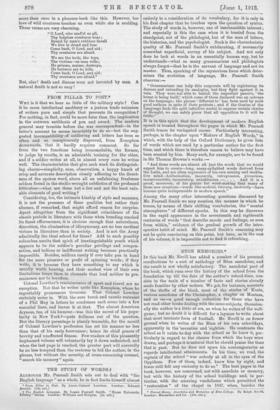THE STUDY OF WORDS4' Am:tonal Mr. Pearsall Smith sets out
to deal with "the English language " as a whole, he in fact limits himself almost
*From Pillar to Post. By LieuteColonel Lowther. London: Edward Arnold. [15s. not.]
t The English Langttage, Ily Logan Pearsall Smith. "Homo University Library" Series. London: Williams and Norgato. Us. not.] entirely to a consideration of its vocabulary, for it is only in his first chapter that ho touches upon the question of syntax, The study of words is, however, one of inexhaustible interest; and especially is this the case when it is treated from the standpoint, not of the philologist, but of the man of letters, the historian, and the psychologist. Such is the characteristic: quality of Mr. Pearsall Smith's exhilarating, if necessarily somewhat superficial, survey of his subject. And not only does he look at words in an essentially human way, but he understands—what so many grammarians and philologists always forget—that he is the servant of language and not its master. Thus, speaking of the mysterious force which deter- mines the evolution of language, Mr. Pearsall Smith observes :--.
" Grammarians can help this corporate will by registering its docroes and extending its analogies, but they fight against it in vain. They were not able to banish the imperfect passive, the house is being built,' which some of them declared was an outrage on tho language ; the phrase different to' has been used by most good authors in spite of their protests ; and if the Genius of the Language finds the split infinitive useful to express certain shades of thought, we can safely guess that all opposition to it will be futile."
It is in this spirit that the development of modern English speech is treated throughout the pages in which Mr. Pearsall Smith traces its variegated career. Particularly interesting, perhaps, is the chapter upon " Makers of English Words," in which, with the help of the Oxford Dictionary, he gives lists of words which are used by a particular author for the first time, and which there is therefore reason to believe may have been created by him. Many such, for example, are to be found in Sir Thomas Browne's works :—
"And these words are almost all just the words that wo would expect him to create—long, many-syllabled words derived from the Latin, and are often expressive of his own musing and medita- tive mind—hallucination, insecurity, retrogression, precarious, incontrovertible, incantatory, antediluvian . • . And it is a proof, moreover, of his genius for word-making that many of those now creations—words like medical, literary, electricity—havo become quite indispensable in modern speech."
Among the many other interesting questions discussed by Mr. Pearsall Smith wo may mention the manner in which he traces, by means of their shifting vocabularies, the "mental atmospheres " of different epochs. In this way he discovers in the rapid appearance in the seventeenth and eighteenth centuries of words "that describe moods and feelings, as seen from within," evidence of the gradual growth of the intro- spective habit of mind. Mr. Pearsall Smith's reasoning may not be quite convincing on this point, but here, as in the rest of his volume, it is impossible not to find it refreshing.






































 Previous page
Previous page